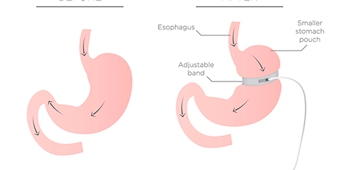
The gastric sleeve surgery is a bariatric procedure that has gained popularity in recent years due to its effectivity in loss of weight and its low rate of long-term complications in comparison with other surgical interventions.
If you are dealing with obesity and have tried losing weigh with strict diets and intense exercise but had no successful results, and you have exhausted every other option, you might be a candidate for a gastric sleeve surgery. If you’re are interested in knowing if you are eligible for a gastric sleeve surgery, call our clinic at Tijuana, Mexico. At LIMARP International Center of Excellence for Obesity, our team of expert, lead by directive surgeon Dr. Liza María Pompa González, will guide you with all the information you need to choose which bariatric surgery is best for you.
The gastric sleeve surgery is a restrictive bariatric procedure where 80% of the stomach is separated through stapling and then extracted, leaving the remaining part of the stomach shaped as a tube that resembles a banana.
The surgical intervention takes approximately 1 hour to complete. Compared with other bariatric surgeries, the gastric sleeve surgery is technically simple, taking less time than other surgical procedures, allowing a shorter recovery period, having less long-term complications and gaining faster loss weight results. This surgery may also be the first step of a more complex intervention for patients with a body mass index (BMI) of 50 or higher, the duodenal switch.
Who is a candidate for gastric sleeve surgery?
Patients with a BMI of 40 or higher that have attempted to lose weight with diets and exercise with little to no success may be eligible for gastric sleeve surgery. Patients with a BMI lower than 40 but higher than 35 might be eligible to this surgery if they have serious comorbidities with other health conditions like diabetes type 2, hypertension, high cholesterol, fatty liver disease, sleep apnea or heart disease.
Teens with a BMI of 40 or higher, with serious health problems might also be eligible for this intervention if they are committed to maintain a lifestyle with healthy diets and regular exercise.
How does it work?
This surgery is called a gastric sleeve because, during the intervention, the stomach is given the shape of a small sleeve. First, the surgeon makes small incisions from outside the belly. One of the incisions will be used to insert a laparoscopic camera that will ease guidance during the procedure. The surgeon introduces a stapler through the other incisions and proceeds to staple the stomach vertically. The stapling completely divides the stomach into two parts. The bigger part, roughly 80% of the stomach, will be removed. The remaining part of the stomach is left with the shape of a tube. This new stomach has now been restricted, which means that its space is now very limited and will be able to handle only small portions of food.
After surgery, you may expect a one to two days recovery stay at our clinic. Rest will be mandatory for four to six weeks, before you are able to return to work or your daily activities.
This surgical procedure may not be reversed, although it can be revised. If by any chance the gastric sleeve ever becomes stretched, it can be re-tightened.
Benefits
The gastric sleeve surgery significantly reduces the size of the stomach, which limits the amount of food you can eat and that by itself allows you to lose weight fast. Since the stomach is restricted in its space, patients can expect to feel full and satisfied way faster, eating way less.
The most convenient benefit from this surgery is that you will also be experiencing less hunger than before, which will get you in the right track of eating less. The portion of the stomach that gets extracted during surgery is the one that carries the glands that produce what is known as “the hunger hormone”: ghrelin.
The glands of the stomach produce and secrete the ghrelin hormone when it’s empty. What the ghrelin hormone does is that it travels through the bloodstream to our brain where it signals hunger or appetite, reminding the body that it should be eating. With the gastric sleeve surgery, no ghrelin hormones will be stimulating appetite through the brain. This makes it a lot easier to control food intake, because the body will not be feeling the urge to eat constantly.
This surgical procedure helps patients improve their health by setting the right conditions to improve their quality of life. It has been proven that the gastric sleeve surgery leads to the resolution or improvement of many health problems such as type 2 diabetes, hypertension, high cholesterol, heart disease, sleep apnea, joint pain, migraine, infertility, fatty liver disease, urinary incontinence, and many others. The surgery doesn’t accomplish this by itself, though. A complete change of lifestyle must follow. The adoption and follow-through of healthy life habits is fundamental.
Risks
Since the gastric sleeve surgery restricts the space of the stomach and creates the effect of having less appetite and feeling full much faster, there is a great risk of malnutrition, although not as much as other bariatric surgeries with malabsorptive properties. This needs to be prevented with a strict eating regimen of constant small-portion meals, rich in protein but low on calories. Taking dietary supplements and vitamins also helps and many doctors recommend it.
Some complications that may arise shortly after the surgery are bleeding, swelling or bruising, pain, and blood clots. Major complications are rare for this type of surgical intervention, especially in the hands of experts, like Dr. Liza María Pompa at LIMARP. Long term complications that may appear and persist months after the surgery are increased frequency of nausea, heartburn, diarrhea, and other issues leading to an upset stomach. Stomach ulcers and gallstones are other long-term risks.
A higher risk of alcoholism and intolerance to certain foods are also at stake due to an increased sensibility and absorption effect of the organism. To avoid any of these complications, patients should follow all doctor’s instructions and attend all follow-up visits.
You have to consider that having any kind of weight loss surgery is a life changing event that has further impact on all aspects of your way of life. It doesn’t just change your appearance, the way you eat and your daily routine, but it also may change the dynamics of the social relations around you.
This is not in itself a risk, because those changes could either be for better or for worse, and it greatly depends of the social and cultural environment of each patient, but it is definitely an impact worth paying attention to. For example, some studies report higher rates of divorce for people that have gone through any type of bariatric surgery.
Contact us
If you’re interested in knowing if a gastric sleeve surgery is the right choice for you, please call us or get in contact with us through any of our social media sites. Our group of certified experts at LIMARP will be glad to educate you on everything you need to know about bariatric surgery and medical attention for patients with obesity.


